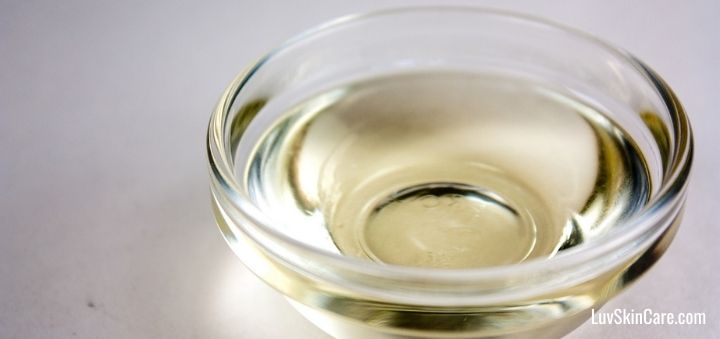With many people becoming more and more interested in the health and beauty benefits of essential oils, it was only a matter of time before the natural alternatives to commercial acne products came to light.
Oils like tea tree and lavender have been used for generations to treat a host of skin issues, as well as general health concerns so it makes sense that something as common as acne could be tackled organically. The only issue with using most essential oils topically is that they can be quite harsh on your skin by themselves. Due to this, they must be diluted in what is known as a carrier oil.
Contents
Table of Contents

8 Best Carrier Oils for Acne
These hydrating, skin friendly oils offer benefits themselves most of the time and act as a buffer to prevent too much of the powerful, acne fighting oils from sinking into your skin. Here are some of the best carrier oils to use in your acne destroying combos!
1. Olive Oil
Used in the Mediterranean for centuries, olive oil is one of the most popular and easily accessible oils in the world. Commonly used in cooking here in the States, olive oil’s skin benefits are often overlooked. Packed full of antioxidants and phenols, olive oil is amazing for calming irritated skin and soothing inflammation.
The two concerns with using olive oil topically are that the oil is frequently cut with inferior oils, forcing you to have to read the labels thoroughly and look for “natural” and “pure” versions to be sure you are getting the real stuff, and that it is rather thick and can leave a residue, meaning it may clog the pores of those with incredibly sensitive skin, though this is not a particularly common issue.
2. Almond Oil
Another popular choice, sweet almond oil is also fairly easy to get your hands on and works great with most stronger oils. Rich in vitamin E, sweet almond oil is also very moisturizing and has natural antioxidant properties that help regenerate skin that has been damaged by sun exposure.
Non-greasy and hypoallergenic, the oil is fantastic for facial usage since it will not clog pores or leave any residue behind. It can even be used before makeup due to its fast absorbing abilities.
3. Coconut Oil
Acclaimed as everything from a healthy cooking alternative to a cancer cure, coconut oil is a bit of a controversial topic. Some claim it to be the best form of medicine on the market while others claim it to be little more than a bit of hocus pocus; either way, coconut oil is proven to be a very effective facial treatment due to its high fatty acid content.
Additionally, it is naturally antibacterial, antimicrobial, and antifungal, making it great for matching up with acne treatments like tea tree oil for a double dose of germ killing power. A word of caution, though, some people do find it to be rather heavy and pore clogging so use with caution over large areas.
4. Jojoba Oil
With over three fourths of its makeup being eicosenoic acid, a fatty acid that closely mimics the sebum that is naturally produced by our faces, jojoba oil is a great choice for those with sensitive skin. Jojoba oil is also antifungal, making it amazing for those with fungal forms of acne or other skin issues related to similar sourcing.
Since it mimics sebum, jojoba will not clog your pores or leave any residue behind and mixes quite well with other oils to make a homogeneous blend. Its antibacterial properties mesh well with other more powerful acne treatments, as well.
5. Moringa Oil
At almost seventy percent oleic acid, moringa oil is a fantastic choice for those with acne scarring, as it has been known to decrease the appearance of sunken or raised scar tissue. The oil is also rich in antioxidants and antibacterial, like many other carrier oils.
When purchasing moringa oil, try to find cold pressed versions, as it assists in repairing sun damage and alleviating oxidative stress while improving elasticity and decreasing the appearance of fine lines and wrinkles.
6. Babassu Oil
Derived from the kernels of the Babassu palm located in Brazil, babassu oil carries a high content of lauric and myristic acids, both of which melt easily at around the same heat level as a human’s body temperature, meaning the oil melds into the skin effortlessly, leaving no residue behind.
Recently, the oil has been used as a substitute for coconut oil, as it is less likely to clog your pores. The only issue is that it can be a bit harder to find, though it is relatively inexpensive and works amazingly.
6. Evening Primrose Oil
Frequently used in ill-advised attempts to induce labor, evening primrose oil is rich in fatty acids and nutrients in a ratio that makes it amazing for mature skin types. The oil has been used for generations to assist in preventing wrinkle formation and lessening the appearance of existing signs of aging.
The moisturizing formula is also quite amazing for dry skin, as it quickly sinks in, locking in moisture and delivering added essential oils deep into bumps and blemishes.
7. Black Seed Oil
Another lesser known carrier oil, black seed oil is an absolutely amazing carrier. Made from the Nigella sativa plant, the oil is rich in both saturated and unsaturated fatty acids that aid in boosting collagen production, helping prevent scarring and aging, along with damage from inflammation and irritation.
People have used it for years to help treat disorders like eczema and psoriasis due to its moisturizing abilities and is generally great for a plethora of skin usages. Look for this one to become popular soon; it is seriously amazing!
8. Neem Oil
Lastly, neem oil is another overlooked oil that is incredibly potent, especially when mixed with other essential oils. From the tropical neem tree, this oil is high in fatty acids, limonoids, vitamin E, triglycerides, antioxidants, and calcium.
Used for a ton of different skin applications, this oil is even accredited for reducing the appearance of moles and warts, which is certainly no easy feat. The only downside that turns some people off of using it is its intense, somewhat harsh odor.
When mixed with essential oils, the smell can be much more manageable, though, especially when used with lavender, tea tree, peppermint, or other strong scents.
